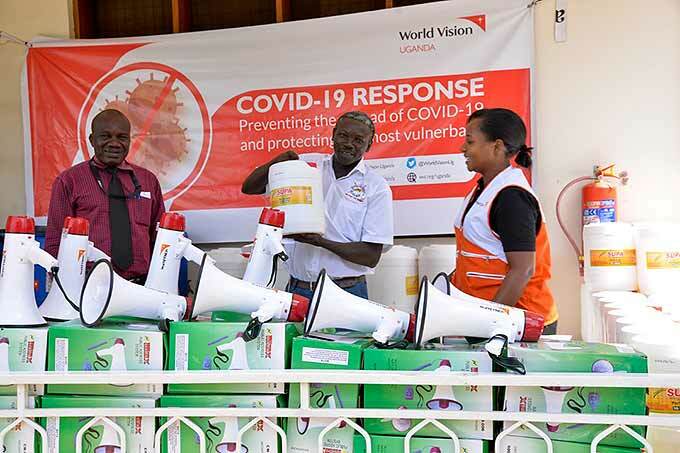World Vision launches sh3b COVID-19 response in Uganda
According to the UNICEF Executive Director Henrietta Fore, any public health response to the pandemic should reach the most vulnerable, including refugees.
HEALTH VIRUS AID
KAMPALA - As COVID-19 pandemic continues to ravage countries, killing people, and destroying livelihoods there is need to shield populations like refugees who are vulnerable.
According to the UNICEF Executive Director Henrietta Fore, any public health response to the pandemic should reach the most vulnerable, including refugees, migrants and those who are internally displaced.
"This means ensuring equitable access to testing and treatment as well as access to prevention information and to water and sanitation services," Fore says.
She explains that an outbreak of a respiratory disease like COVID-19 could spread easily through the overcrowded confines and unsafe conditions typical of many camps or settlements.
"Families in these environments would be more likely to get sick and less capable of fighting off the disease because of inadequate services," Fore says.
In a bid to avert such scenarios, the World Vision launched a $1m (sh3bn) COVID-19 Emergency Response to support the refugee communities in West Nile and 53 districts.
On April 9, hygiene equipment and supplies worth hs2billion were dispatched to support 5000 government health facilities and hospitals in 38 districts where world vision supports over 2 million children and their families.
 World Vision handing over 2,560 litres of liquid soap and other items to the Arua District Health Officer. (Courtesy Picture)
World Vision handing over 2,560 litres of liquid soap and other items to the Arua District Health Officer. (Courtesy Picture)
The response was kicked off with a handover of 4,050 boxes of soap (40,500 bars) to the Office of the Prime Minister. The soap is to help about 150,000 vulnerable children and people with special needs in refugee settlements.
"We also fully recognize that before long we will need to consider livelihood interventions. The question many are asking is whether effectively managing the COVID-19 pandemic is a big risk as that of economic collapse," Says Jason Evans, the National Director World Vision.
The program seeks to promote preventive measures to slow the spread of the virus, support health systems and its workers and provide children and their families multisector support during the crisis.
"For now we are focusing on mitigating the spread of COVID-19 but soon we will need to start working with communities to ensure that they can plant crops and become active in bringing resources into their homes because if we cannot achieve this, we risk seeing communities slip back into poverty, with as usual the higher impact on the children," Evans says.
World Vision has also partnered with Ministry of Health and local government to set up isolation centres with mattresses; provide food for suspected cases; train Village Health Teams (VHTs) to carry out door-to-door sensitization with megaphones; distribute hand-washing facilities and soap to households and health centres; provide personal protective equipment for health workers; carry out sensitisation and awareness campaigns, and support coordination activities at the district level.
They have also contributed over 3,000 liters of fuel to district task force members to respond to the crisis.
The response primarily targets children under World Vision care and follow up in Bidibidi, Rhino, Imvepi, Parolinya, Omugo and Adjumani refugee settlements.
Over 800,000 children have been forced to flee their homes because of conflict, violence and persecution and are already living in precarious and insecure conditions in the refugee settlements in Uganda.
The impact of restricted freedom of movement and of service suspension on vulnerable children must be fully understood and responded to.